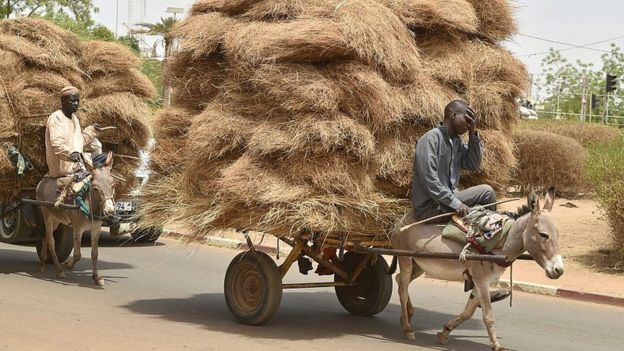Niger has banned the export of donkeys, warning that a three-fold increase in trade, mainly to Asian countries, is threatening its donkey population.
"If the export continues the animals will be decimated," a government official has told the BBC.
China imports many donkey hides, using the gelatin in medicinal tonics, aphrodisiacs and anti-ageing creams.
In August, neighbouring Burkina Faso banned the export of donkey skins on similar grounds.
"About 80,000 donkeys have been exported so far this year compared to 27,000 last year," Atte Issa, at Niger's livestock ministry, said.
The government has also banned the slaughter of any donkeys within Niger.
The BBC's Baro Arzika in Niger's capital, Niamey, says the trade in donkeys has become so profitable that livestock sellers are abandoning other animals for the donkey trade.
A donkey now costs between $100 (£75) and $145, when it used to cost about $34.

A similar price hike in donkey skin was witnessed in Burkina Faso where the animal's hide rose from about $4 (£3) a few years ago to $50.
In both countries donkeys are commonly used to transport goods, though some communities eat their meat.
The ban was issued through a joint decree by Niger's ministries of farming, finance and internal affairs and trade.
Why China can't get enough donkeys: By Fuchsia Dunlop, BBC News
Gelatin made from donkey skin is highly prized in China as a medicinal tonic, thought to nourish the blood, boost the immune system and act as a general pick-me-up. It is sometimes referred to as one of the "three nourishing treasures" (zi bu san bao), along with ginseng and the antlers of young deer.
The most famous donkey gelatin is produced in Dong'e County in north-eastern Shandong Province, where it is traditionally made with the local well-water.
Donkey gelatin is sometimes mixed with walnuts, goji berries and other tonic foods and sold in dark, gummy slabs that can be eaten as a snack.
Health and longevity is a Chinese national obsession, and tonic foods like this are often lavishly packaged and presented as expensive gifts.
Aside from gelatin, donkey meat is a delicacy in some Chinese regions, especially in the north of the country.
Here, the lean meat is often simmered in a richly-spiced broth, and then cooled, sliced and served with a refreshing dip of chopped garlic and vinegar. The meat has a fine, dense texture and a marvellous flavour that's a little reminiscent of beef.
In northern Hebei province, one famous snack is the lu rou huo shao, in which chopped, spiced donkey meat is mixed with fresh green chilli and stuffed into a layered pastry - its name is sometimes translated into English as a "donkey burger".
Donkey meat may also be made into soups and stews.
As the Chinese middle classes have grown richer, demand for donkey gelatin and other tonic delicacies has soared - in January the New York Times reported that a shortage of donkey gelatin had encouraged a boom in imitation products.
Latest Stories
-
We reaffirm our unwavering support for government’s efforts to ensure stable, affordable electricity – IPGG
3 minutes -
Baseball: Ghana’s Golden Palms retain African Youth Championship title
7 minutes -
ORAL is set up to settle political goals, revoke it – Ansah-Asare
7 minutes -
Hamas has accepted a draft agreement for a Gaza ceasefire and the release of hostages, officials say
9 minutes -
Joy Prime’s Changes Wedding Gown giveaway: Rose Abaya rocks gifted gown from Peace Bridals
13 minutes -
This economy has to deliver jobs for Ghanaians – Dr Theo Acheampong
19 minutes -
I went to Shatta Wale for advice during my campaign – A Plus
26 minutes -
Mahama embarks on peace mission to Bawku and Nalerigu
30 minutes -
Karela United closes in on Nurudeen Amadu as new head coach
51 minutes -
Kotoko’s Amoah ruled out for 2 months with ankle injury
1 hour -
Akufo-Addo’s government showed no interest in investigating election-related deaths – Peter Toobu
1 hour -
ORAL is corruption CCTV – Ablakwa
1 hour -
Rising bond yields point to fiscal challenges for sovereigns – Fitch
2 hours -
Otto Addo is not the right man for the Black Stars – Osei Palmer
2 hours -
ORAL operation: I receive threats daily – Okudzeto Ablakwa
2 hours

